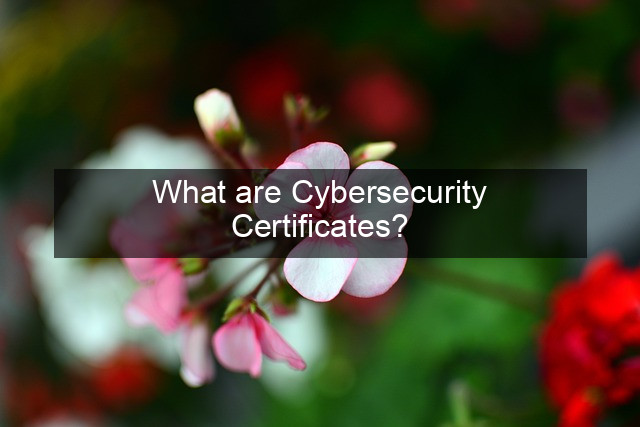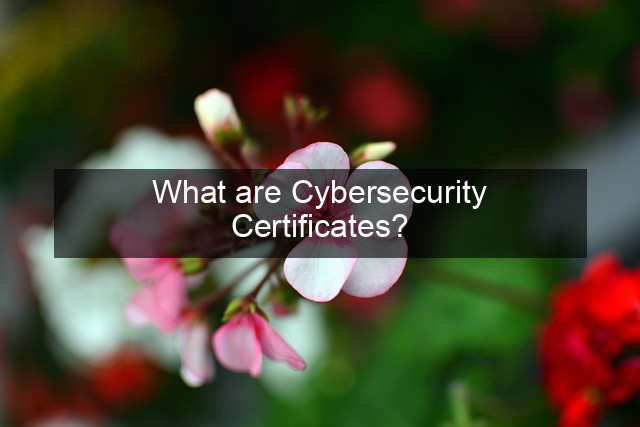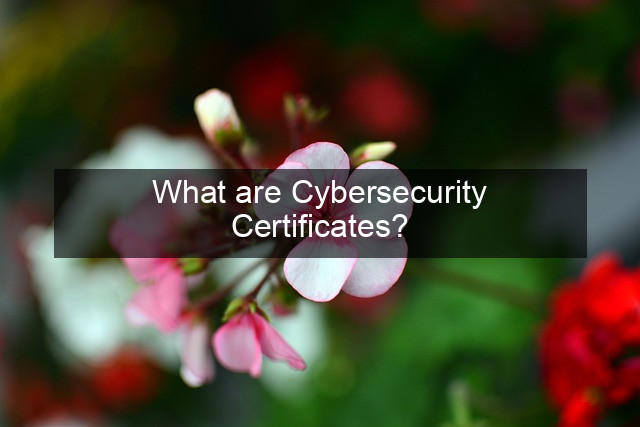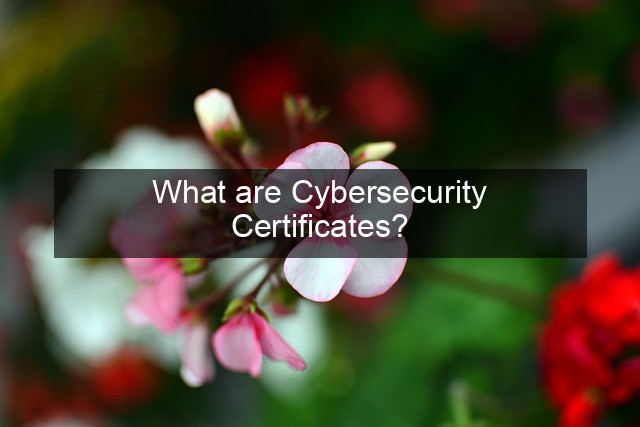What are Cybersecurity Certificates?

- What are Cybersecurity Certificates?
- What are Cybersecurity Certificates?
- Types of Cybersecurity Certificates
- Entry-Level Certifications
- Specialized Certifications
- Vendor-Specific Certifications
- Benefits of Earning Cybersecurity Certificates
- Enhanced Career Opportunities
- Increased Earning Potential
- Improved Job Security
- Choosing the Right Cybersecurity Certificate
- Assess Your Career Goals
- Research Certification Requirements
- Consider Your Budget
- Conclusion
- FAQ

What are Cybersecurity Certificates?
In today’s interconnected world, where data breaches and cyberattacks are increasingly common, cybersecurity has become paramount. Businesses and individuals alike recognize the critical need to protect sensitive information and digital assets. One way to demonstrate expertise and commitment to this crucial field is through cybersecurity certificates. These credentials validate specific skills and knowledge, providing a competitive edge for professionals and assuring employers of their capabilities. Cybersecurity certificates offer a focused approach to learning, often specializing in particular areas like ethical hacking, network security, or data privacy. They signify a dedication to staying updated with the ever-evolving cybersecurity landscape and the latest threats. This introduction will delve into the world of cybersecurity certificates, exploring their types, benefits, and significance in the digital age.
Types of Cybersecurity Certificates
Entry-Level Certifications
For individuals new to the field, entry-level cybersecurity certificates provide a foundational understanding of core concepts. These certificates often cover topics such as network fundamentals, basic security principles, and common threats. They serve as a stepping stone for further specialization and advanced certifications. These entry-level credentials can open doors to entry-level positions in cybersecurity and provide a solid base for career progression.
Examples of entry-level certifications include CompTIA Security+, which validates baseline security skills, and the GIAC Security Essentials Certification (GSEC), which focuses on practical security knowledge.

These certifications are ideal for those looking to transition into cybersecurity or gain a basic understanding of the field.
Specialized Certifications
As professionals gain experience, they can pursue specialized cybersecurity certificates that focus on specific areas of expertise. These certifications delve deeper into particular domains like penetration testing, cloud security, or digital forensics. They demonstrate a high level of competency in a chosen area and can significantly enhance career prospects.

Examples include the Certified Ethical Hacker (CEH) for penetration testing, the Certified Information Systems Security Professional (CISSP) for security management, and the Certified Cloud Security Professional (CCSP) for cloud security expertise.
Specialization allows professionals to become experts in their chosen niche and command higher salaries.
Vendor-Specific Certifications
Many technology vendors offer their own cybersecurity certificates focused on their specific products and platforms. These certifications validate expertise in using and securing vendor-specific technologies, making them valuable for professionals working with those systems.
Examples include Cisco certifications for network security and Microsoft certifications for Azure security. These credentials demonstrate proficiency with specific technologies and are highly sought after by organizations using those platforms.
Vendor-specific certifications can enhance job prospects within organizations that rely on specific vendor technologies.
Benefits of Earning Cybersecurity Certificates
Enhanced Career Opportunities
In a highly competitive job market, cybersecurity certificates can set individuals apart from other candidates. They demonstrate a commitment to professional development and validate specific skills that employers seek. These credentials can open doors to new job opportunities and advancement within current roles.
The demand for cybersecurity professionals is constantly growing, making certifications a valuable asset for career progression. They can lead to higher salaries and more challenging roles.
Certifications provide tangible proof of skills and knowledge, giving candidates a competitive edge.
Increased Earning Potential
Cybersecurity certificates can significantly impact earning potential. Employers are willing to pay a premium for professionals with validated expertise in this critical field. Earning relevant certifications can lead to salary increases and greater earning power throughout a career.
The value of certifications is reflected in higher salary offers and greater earning potential over time.
Investing in certifications can lead to a significant return on investment in terms of increased earning power.
Improved Job Security
As cyber threats continue to evolve, the demand for skilled cybersecurity professionals remains high. Earning cybersecurity certificates demonstrates a commitment to staying current with the latest threats and technologies, enhancing job security in this ever-changing field.
Certifications provide a level of job security in a field where skills are constantly in demand.
Staying updated with the latest certifications ensures professionals remain valuable assets to their organizations.
Choosing the Right Cybersecurity Certificate
Assess Your Career Goals
Before pursuing a cybersecurity certificate, it’s crucial to assess your career goals. Identify the specific area of cybersecurity that interests you and aligns with your long-term aspirations. This will help you choose a certification that supports your career path.
Consider your current skills and experience when choosing a certification path.
Research different certification options and their relevance to your career goals.
Research Certification Requirements
Each cybersecurity certificate has specific requirements, including prerequisites, exam fees, and renewal processes. Thoroughly research these requirements to ensure you meet the eligibility criteria and understand the commitment involved.
Check for any prerequisites, such as work experience or prior certifications.
Understand the exam format and the topics covered.
Consider Your Budget
Cybersecurity certificates can vary in cost, including exam fees, training materials, and renewal costs. Consider your budget and explore available funding options, such as employer reimbursement programs or scholarships.
Factor in the cost of training materials and exam fees.
Explore potential funding options to help offset the cost of certification.

| Certification | Description |
|---|---|
| CompTIA Security+ | Entry-level certification covering core security concepts. |
| CISSP | Advanced certification for experienced security professionals. |
| CEH | Specialized certification for ethical hackers. |
- Research different certification paths.
- Consider your career goals.
- Choose a certification that aligns with your interests and aspirations.
Conclusion
Cybersecurity certificates play a vital role in the ever-evolving landscape of digital security. They provide individuals with a pathway to demonstrate expertise, enhance career prospects, and contribute to a more secure digital world. By validating specific skills and knowledge, these credentials empower professionals to stay ahead of emerging threats and protect valuable digital assets. As the demand for cybersecurity professionals continues to grow, the importance of certifications will only continue to increase.
FAQ
What is the difference between a cybersecurity certificate and a degree?
A cybersecurity certificate is a focused credential that validates specific skills and knowledge, while a degree provides a broader education in the field. Certificates are often shorter in duration and more specialized than degree programs.
How long does it take to earn a cybersecurity certificate?
The time required to earn a cybersecurity certificate varies depending on the specific certification and the individual’s learning pace. Some certificates can be earned in a few months, while others may take a year or more.
Are cybersecurity certifications expensive?
The cost of cybersecurity certifications varies depending on the specific certification and the training resources used. Exam fees can range from a few hundred to several thousand dollars. However, many employers offer reimbursement programs for certification expenses.
How do I choose the right cybersecurity certificate for me?
Consider your career goals, experience level, and budget when choosing a cybersecurity certificate. Research different certifications and their requirements to find the best fit for your needs.
Do cybersecurity certifications expire?
Many cybersecurity certifications require renewal after a certain period, typically every two or three years. This ensures that professionals stay up-to-date with the latest technologies and threats.
What are the job prospects for cybersecurity professionals with certifications?
The job market for cybersecurity professionals is strong and growing. Certifications can significantly enhance job prospects and earning potential in this high-demand field.




